KATHMANDU: As lockdown is being loosened in Nepal, Dr Jos Vandelaer, World Health Organization Representative to Nepal, focusses on the importance of individual responsibility and personal discipline.
He requests one and all to adhere to the precautions like maintaining physical distance, washing hands regularly, using reusable masks especially in crowded areas, and not touching eyes, nose, and mouth unnecessarily.
He also requests one and all to receive and trust only credible sources for their daily news (such as the Ministry of Health and Population, the World Health Organization, and the United Nations).
Dr Vandelaer talked to Khabarhub on the current COVID-19 situation in the country. Excerpts:
The number of coronavirus cases in Nepal has increased in recent days. 19 people have already lost their lives as of Sunday. How do you see the situation in the coming days?
Majority of the new coronavirus cases in Nepal have been detected among people who have returned to the country from outside.
Although in some cases, it has been difficult to establish whether they had travelled or had been in touch with someone who had travelled.
There is currently no evidence of widespread transmission in the communities. We can expect for cases to continue to go up as more people return from India.
But it’s difficult to make a more detailed prediction. As the lockdown is being loosened, we would like to focus on the importance of individual responsibility. Personal discipline will be most important here.
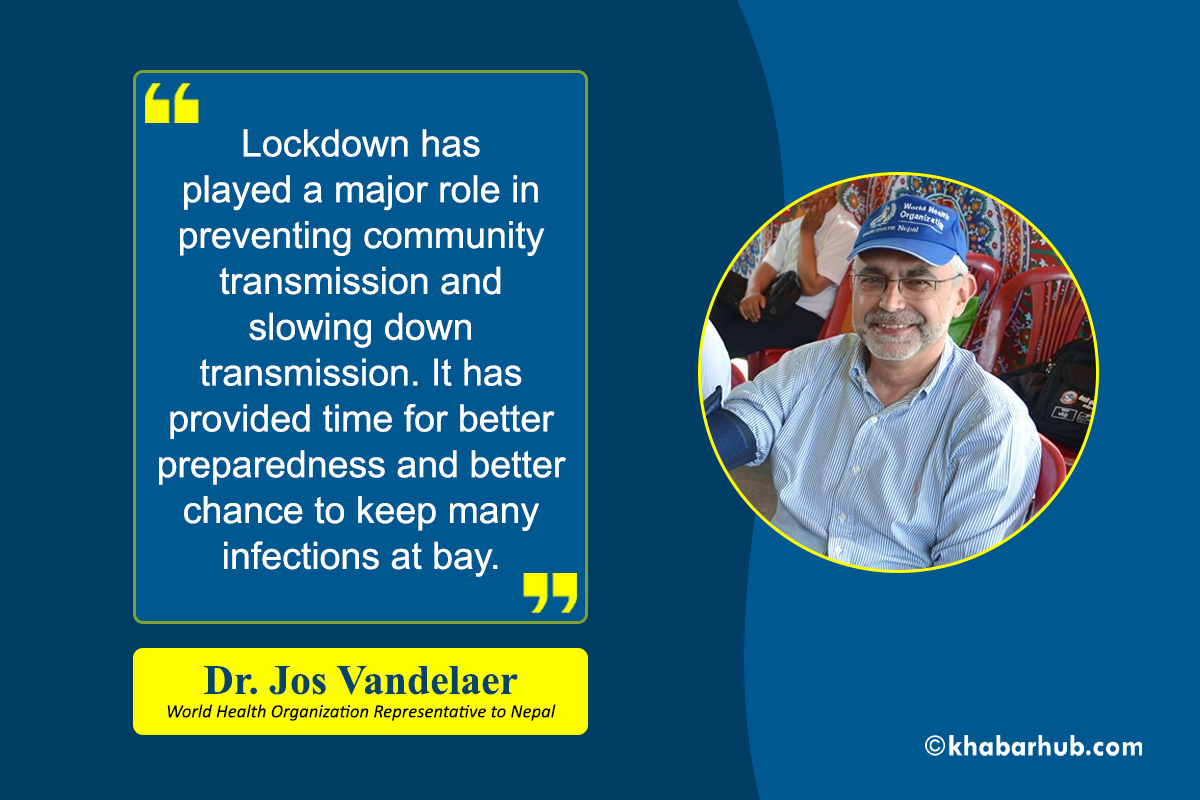
We request everyone to adhere to the necessary precautions (washing hands regularly; maintaining physical distancing (minimum of 1meter/3 feet); using reusable masks especially in crowded areas; not touching nose, eyes, and mouth unnecessarily combined with regular handwashing; following proper respiratory hygiene; seeking medical advice if you think you have symptoms for COVID-19).
We also request all to receive and trust only credible sources for their daily news (such as the Ministry of Health and Population (MoHP), the World Health Organization, and the United Nations). Meanwhile, testing will continue so that anyone who tests positive (and their contacts) can be isolated to prevent further spread of the virus.
How do you assess the Government of Nepal’s efforts to stem the spread of coronavirus?
COVID-19 is testing the capacity of health systems on a global scale. Nepal, a developing country which is still recovering from the many consequences of the massive 2015 earthquake, is no exception.
The pandemic has arrived at a time while Nepal is implementing federalism as a system of governance which presents a unique set of challenges and opportunities.
This is a new situation and a new disease, and every country is facing problems with it. There is no premade plan to combat COVID-19.
Communication activities have rolled out to inform people better about COVID-19. The surveillance mechanism has been improved to quickly investigate cases; and identify and trace contacts.
However, the MoHP, the Government of Nepal (GoN), has moved forward, and is continuing, to work on several public health interventions in a concerted manner for enhanced preparedness and response readiness; and despite global supply bottlenecks in Personal Protective Equipment (PPE) and other commodities, the GoN has been working towards securing these for Nepal.
During the lockdown period, the government has taken several measures to prepare its COVID-19 response. Hospitals have been designated as COVID-19 hospitals, and work has gone into training and preparing these hospitals.
The laboratory network to test for COVID-19 has been vastly expanded from 1 (in January) to 21 today. Numerous supplies, from PPE to RT-PCR tests have been purchased and many donors have provided financial and in-kind support.
Communication activities have rolled out to inform people better about COVID-19. The surveillance mechanism has been improved to quickly investigate cases; and identify and trace contacts.
What measures should the government take in such a situation? Do you want to give any suggestions to the government to contain its spread?
There is no blueprint to navigate COVID-19. This is a new situation for all countries. From global experiences, we have seen that an effective response to COVID-19 requires an all-of government and an all-of-society approach.
This means that tackling COVID-19 is everybody’s business. The government must ensure that infection is detected early through targeted testing, and that infected individuals and their contacts are isolated/quarantined, so that they cannot infect other people.
Medical care must be brought up to speed to treat the serious cases of COVID-19. Governments can impose measures, like a lockdown, that prevents further spread of the virus.
All this requires close collaboration between different ministries, and between national, provincial and local levels of government.
Moreover, as a society, all individuals must also contribute. It is everybody’s responsibility to maintain physical distance from each other, and to wear masks especially where keeping distance is more difficult.
If the virus is present on the hands, regular handwashing will prevent one getting infected when they touch their mouth, nose, or eyes. If one coughs, ensure not to cough in the direction of other people.
And when feeling ill, contact a medical professional immediately. These measures need to be taken, even more so when there is no full lockdown in place.
The government came under pressure to ease the lockdown from several quarters. What is your take on this?
As stated, this is a first for all countries, and no two countries will follow the same procedures. The lockdown has played a major role in preventing community transmission and slowing down transmission, and has provided time for better preparedness and better chance for Nepal to keep many infections at bay.
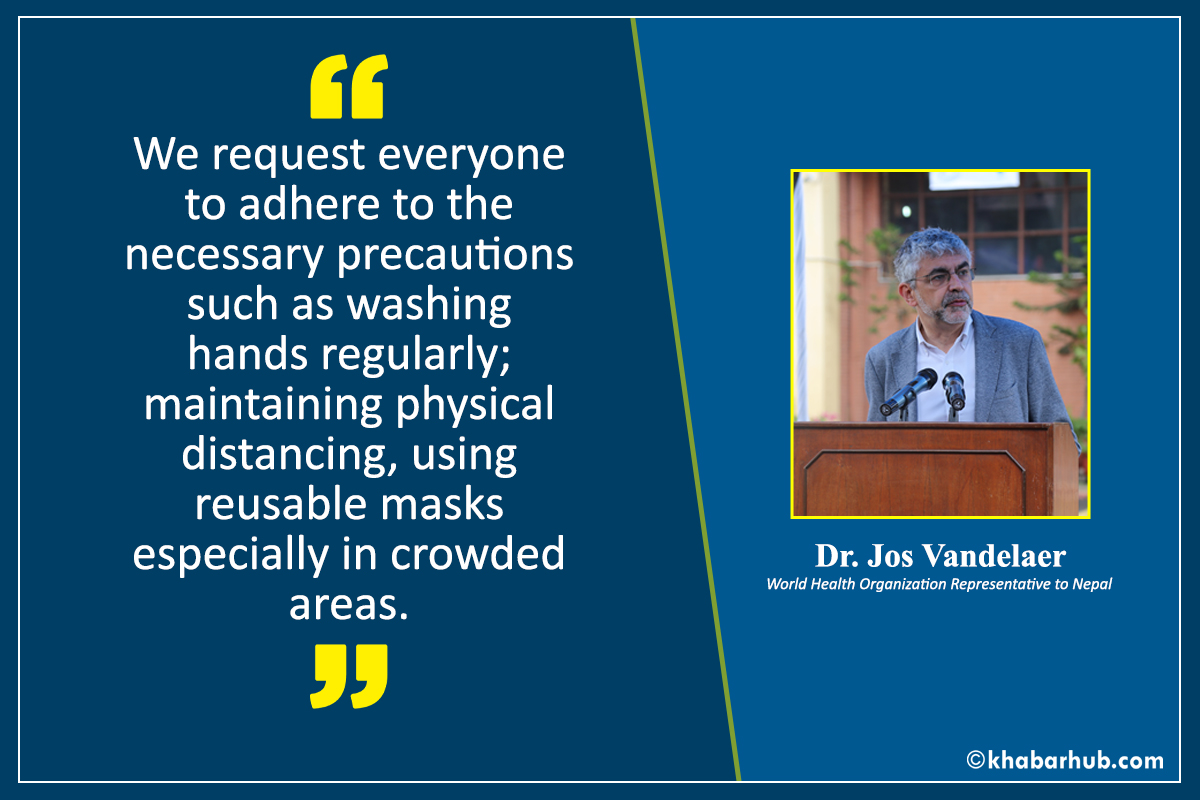
So, from an epidemiological view, it can be effective. But the effects of the lockdown are not only health-related, they are also socio-economic, and it can be difficult to strike a balance.
The lockdown affects people in various aspects of their lives, not just their health. Decisions about loosening a lockdown therefore need to consider not only the situation of the disease, but also the other effects a lockdown may have.
If the government decides to loosen the lockdown, it would be important for all of us to remain cautious. Even is a lockdown is loosened, countries must continue to find; isolate; test and care for every case; and trace and quarantine every contact.
That is every country’s best defense against COVID-19. And everyone must maintain physical distance, wash hands regularly, adhere to cough etiquette, and seek medical care as soon as symptoms start. Wearing a mask can help but cannot be a replacement for any of these actions.
Do you think that the tests (both PCR and RDT) performed in the country are reliable as more and more people have been entering the country from Indian and abroad?
These two tests are very different. Both have their own characteristics. The RDT test basically looks at the antibody which are seen 10 to 14 days after being infected.
Antibodies tell you that the person has been in touch with the virus, but it does not tell you when the person got infected.
In Nepal, this may not be easy, as often, people live in extended families and often in relatively small houses. Similarly, when people are quarantined in quarantine sites, there should be enough space between beds, water and sanitation facilities must be sufficient, food and water must be provided at regular intervals, different groups should not intermingle etc.
If you want to see whether a person harbours the virus, then you need to do a PCR test. PCR tests look for viruses or virus particles.
The RDTs or antibody tests will not tell you whether you currently have the virus. PCR tests are done in designated laboratories, while RDT tests can be used by anyone. The quality of available RDT tests in the market can vary substantially.
How did you find the condition of the quarantines throughout the country?
The purpose of quarantine is to keep people who are potentially infected away from other people, and by doing so, prevent transmission.
The government’s policy is to quarantine all people entering Nepal for at least 14 days, precisely to prevent infection.
After 14 days of quarantine, any virus that would have been present would no longer be viable, and therefore people when released after 14 days of quarantine would no longer be infectious.
Quarantine can be done in several ways. It can be done by quarantining groups of people together in a closed-off location, such as schools, hotels, or camps, or it can be done by quarantining people at home.
For each of these methods, several basic measures must be taken. For example, for home quarantine, the quarantined person needs to have a separate room and bathroom, have his/her own utensils, eat separately etc., and there should not be highly vulnerable people living in the same house.
In Nepal, this may not be easy, as often, people live in extended families and often in relatively small houses. Similarly, when people are quarantined in quarantine sites, there should be enough space between beds, water and sanitation facilities must be sufficient, food and water must be provided at regular intervals, different groups should not intermingle etc.
Moreover, there is no one way to do quarantine. In the case of Nepal, what we have seen is that there has been a large influx of people into the country in recent weeks, and the authorities have struggled to find sufficient accommodation for their quarantine in a very short time.
This has led in some locations to suboptimal conditions when it comes to quarantine sites.
Let’s talk about the lockdown that is making people’s live difficult amid fears that people are becoming more susceptible to other diseases. How do you analyze this situation?
A lockdown will not only have an effect on the spread of COVID-19, it will also have economic repercussions, as some people will not be able to go to work and hence will loose their income.
But a lockdown may also make it more difficult for regular health services to continue. People may have difficulties in reaching health facilities, or be afraid to go to a health provider, and health workers may be occupied with COVID-19 preparations and response.
The result can be that people who need care, for example pregnant women who need to deliver, or people with hypertension or tuberculosis who need regular treatment, can no longer get the treatment and care they need.
This should not happen, but we know that throughout Nepal, the use of regular health services has declined during the lockdown.
This also goes for preventive services such as immunization or antenatal care. In many areas, health workers have done their best to ensure that these kinds of essential services have continued despite the lockdown, but it has not always been easy.
We would urge everyone who needs healthcare, be it preventive or curative, to not unnecessarily postpone a visit to the health facility. Because there is indeed a risk that if essential treatments or services are interrupted for too long, people will become more susceptible to the negative effects of such interruptions.
Adding more to it, the prolonged lockdown has affected the immunization programs. Don’t you think that this will affect the children in future?
In normal times, more than 90% of Nepali children are immunised with multiple vaccines that are available in Nepal, which makes Nepal one of the top countries in the world to successfully implement immunization programs.
But due to COVID-19, in several places, immunization services have been scaled down or halted, including a measles-rubella vaccination campaign that had been planned.
What we now see is that in some places, immunization programs are restarting, often at the demand of parents who are worried that their children are not sufficiently protected against illnesses.
The local authorities can also play a major role in encouraging this restart. Because of the strength of the immunization program in Nepal, with high coverage year after year, an outbreak is unlikely if the immunization programs are stopped for a few weeks.
But if immunisation services are interrupted for too long, the number of children who are not immunised will increase, and these children may soon become susceptible to vaccine-preventable diseases.
For that reason, it is important that not only essential services, like immunisation, but also the provision of essential drugs and other interventions continue or are resumed as soon as possible.
Would you like to add anything more on the current situation?
Loosening the lockdown is not the end of the COVID-19 crisis. On the contrary, everyone needs to be more vigilant and more rigorous in taking precautions. Personal discipline to follow safety measures is crucial.


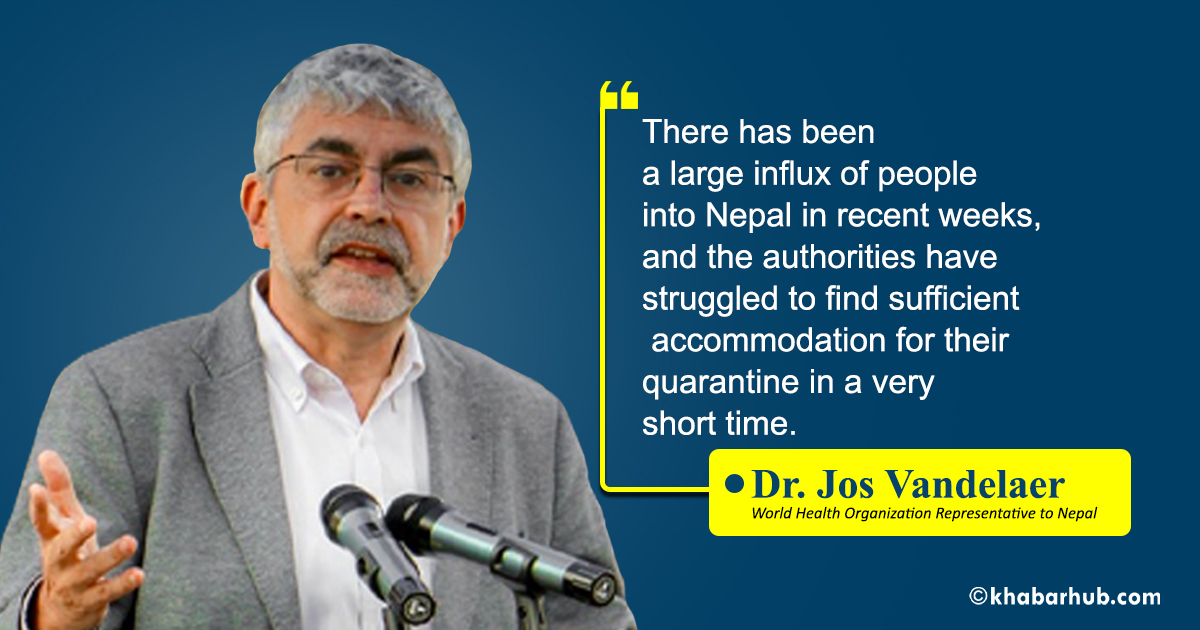

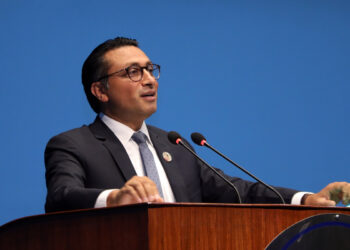


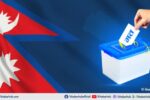

Comment